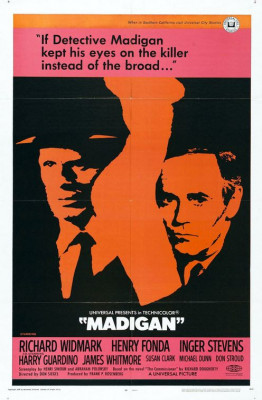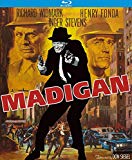| Reviews & Columns |
|
Reviews DVD TV on DVD Blu-ray 4K UHD International DVDs In Theaters Reviews by Studio Video Games Features Collector Series DVDs Easter Egg Database Interviews DVD Talk Radio Feature Articles Columns Anime Talk DVD Savant Horror DVDs The M.O.D. Squad Art House HD Talk Silent DVD
|
DVD Talk Forum |
|
|
| Resources |
|
DVD Price Search Customer Service #'s RCE Info Links |
|
Columns
|
|
|
Madigan
Much of the rest of the cast draws from New York-rooted actors like Harry Guardino and Frank Marth, and the film makes excellent use of its seedy Spanish Harlem and Brooklyn locales. But parts of it were also shot on the Universal backlot, and apparently its climax was filmed somewhere in downtown Los Angeles, enhanced by Albert Whitlock's seamless matte paintings. Released seven months before implementation of the MPAA's rating system, the film has mild swearing, fleeting nudity, and more violence than the usual Hollywood movie, but tame in comparison with the permissiveness soon allowed. In some respects, Madigan also anticipates Universal's soon-to-follow Airport (1970) as much as Dirty Harry, with its central character's unhappy marriage mirroring the soap opera-ish dramatics of Burt Lancaster and Dana Wynter in that seminal movie. But, overall, it's a very good picture, with much of the credit due to Siegel's kinetic direction and cutting.
Police detectives Dan Madigan (Widmark) and Rocco Bonaro (Guardino) break into the Spanish Harlem apartment of homicide suspect Barney Benesch (Steve Ihnat) but, momentarily distracted by his nude (and, implied, underage) girlfriend, Benesch grabs Madigan's pistol and escapes. Faced with losing their jobs over this carelessness, their boss, Lt. James Price (Frank Marth), gives them three days to locate Benesch, while Police Commissioner Anthony X. Russell (Fonda) is apprised of the situation.
Russell has his own problems, after lifelong friend Chief Inspector Kane (James Whitmore) is caught on tape accepting a bribe, throwing both of their careers in jeopardy. Further, a black minister (Raymond St. Jacques) has accused the department of police brutality following the arrest of his son; and Russell's mistress, Tricia (Susan Clark), unable to leave her husband, is about to break off their relationship. Madigan has personal problems, too, with wife Julia (Inger Stevens) unhappy about her husband's long, unpredictable hours.
Working under intense sleep deprivation, Madigan and his partner try to track down the wanted Benesch, now armed with Madigan's pistol, which he'll use before the movie's over.
The actors all admired Siegel but everyone loathed the producer, Frank Rosenberg, who according to multiple reports needled the director constantly, insisting upon changes that mostly threatened the picture's verisimilitude and/or obsessed over little details. He forced Siegel and the actors to shoot a critical, emotional scene on the very first day of production, and for the climax, ordered the crew back to Los Angeles and insisted upon an ill-suited location (Siegel eventually won that battle after going over Rosenberg's head). Rosenberg also meddled with the script, to the point of having the actors rerecord bits of dialogue, in at least one case adding a single, insignificant word ("the"). New York actor Conrad Bain, making his screen debut, may have been one of Rosenberg's "victims"; his brief performance as a hotel front desk man is entirely dubbed.
Madigan's curious structure divides its time equally between Widmark and Fonda, each morally ambiguous, but they share no scenes until almost the end, when Madigan, already under enormous pressure to locate Benesch, reluctantly agrees to take Julia to the fancy-dress policemen's ball at the Sherry-Netherland Hotel. He plans on dumping her there with no prior warning (right into the arms of a colleague-womanizer, played by Warren Stevens) but before he can skedaddle runs smack into Commissioner Russell, who says almost nothing but Madigan can feel the daggers shooting from his eyes. It's an excellent, notably awkward moment.
Indeed, Fonda's performance is one of his best, eschewing his usual Nebraska-bred folksiness for a cold austereness; even his massive desk has almost nothing on it, little-to-nothing of it of a personal nature. Russell is all-business, circumspect and unreadable, fair but singularly intimidating.
The movie's domestic scenes with Julia and Tricia don't add much. Julia's complaining comes off as particularly shrill - what did she expect, marrying a cop? However, Inger Stevens's scene with Warren Stevens, he pushing too hard to take the dead-drunk Julia home to his apartment, and her hazy gradual awareness of what she's doing, is well-played.
Mostly, it's Siegel's excellent direction and his use of real locations that make Madigan work. He and cameraman Russell Metty, who also shot Welles's Touch of Evil (1958), give it the same kind of stately fluidity as that picture, but without the cinéma vérité unattractiveness of Dirty Harry. The flashes of violence are marvelously edited, too, for maximum, even shocking effect, particularly at the end. He's also good with the actors, with supporting players like Whitmore, Michael Dunn (as a reluctant informant), The Naked City's Harry Bellaver (as a drunk ex-boxer witness) and others in memorable vignettes.
Video & Audio
Madigan was one of a series of movies Universal shot in two-perf Techniscope, a cost-saving measure used on a large number of titles well into the early ‘70s. Kino's presentation is mostly excellent, pulling fine detail while leaving the process's inherent graininess. The DTS-HD Master audio, mono, is also good. English subtitles accompany this Region "A" disc.
Extra Features
Other than a trailer and TV spots, supplements are limited to a lively audio commentary track with film historians Howard S. Berger, Steve Mitchell, and Nathaniel Thompson.
Parting Thoughts
While not always cohesive in its blending of old- and new-Hollywood styles, Madigan is a strong transitional work and Highly Recommended.
Stuart Galbraith IV is the Kyoto-based film historian currently restoring a 200-year-old Japanese farmhouse.
|
| Popular Reviews |
| Sponsored Links |
|
|
| Sponsored Links |
|
|
| Release List | Reviews | Shop | Newsletter | Forum | DVD Giveaways | Blu-Ray | Advertise |
|
Copyright 2024 DVDTalk.com All Rights Reserved. Legal Info, Privacy Policy, Terms of Use,
Manage Preferences,
Your Privacy Choices | |||||||














